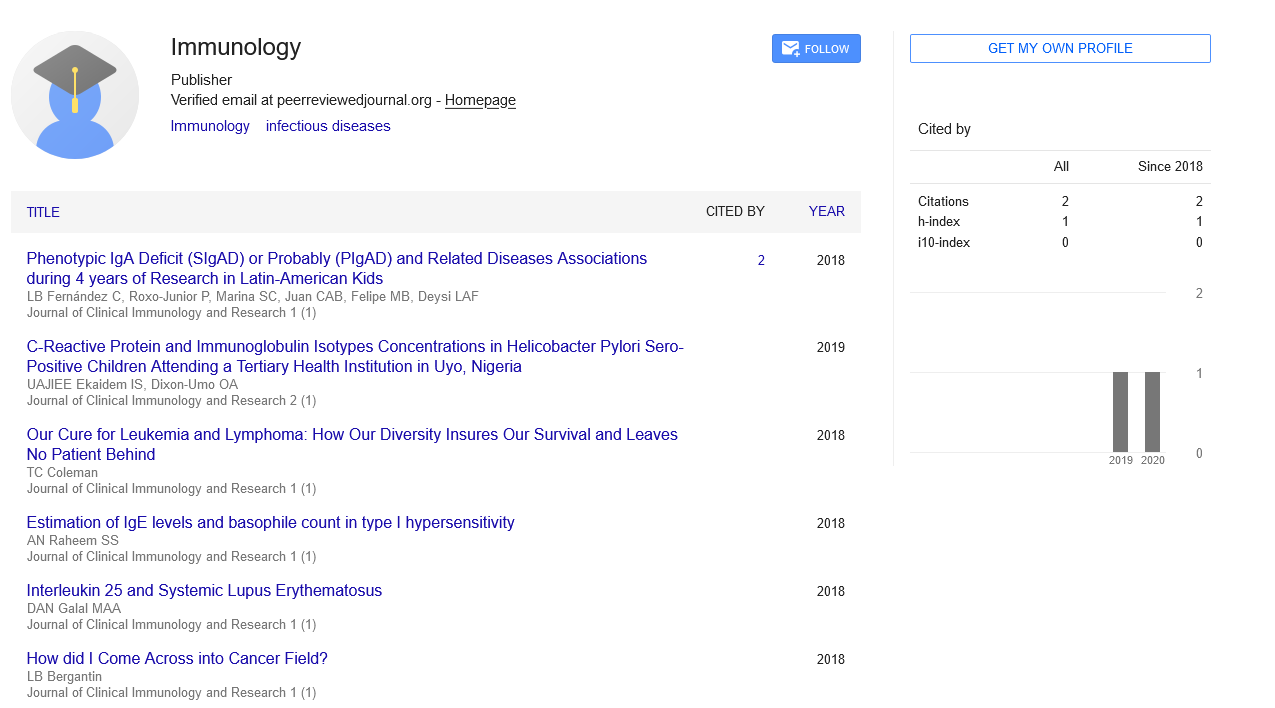Opinion Article, J Clin Immunol Res Vol: 6 Issue: 1
Immunological Reactions to Transplant Allograft Rejection
Sommer Wan Che*
1Department of Cardiovascular Surgery, Sun Yat-sen Memorial Hospital, Sun Yatsen University, Guangzhou, China
*Corresponding Author: Sommer Wan Che
Department of Cardiovascular
Surgery, Sun Yat-sen Memorial Hospital, Sun Yat-sen University, Guangzhou,
China
E-mail: somwanch@mail.sysu.edu.cn
Received date: 19 March, 2023, Manuscript No. JCIR-23-99618;
Editor assigned date: 22 March, 2023, PreQC No. JCIR-23-99618 (PQ);
Reviewed date: 05 April, 2023, QC No. JCIR-23-99618;
Revised date: 12 April, 2023, Manuscript No. JCIR-23-99618 (R);
Published date: 19 April, 2023, DOI: 10.4172/JCIR.100069
Citation: Che SW (2023) Immunological Reactions to Transplant Allograft Rejection. J Clin Immunol Res 6:1.
Description
Transplantation is a life-saving procedure that involves the transfer of organs, tissues, or cells from a donor to a recipient. While transplantation improves the recipient's quality of life, it triggers complex immunological responses leading to allograft rejection. This occurs when the recipient's immune system recognizes the transplanted tissue as foreign and mounts an immune response against it.
Types of transplant rejection
Transplant rejection can be classified into three main types: hyperacute rejection, acute rejection, and chronic rejection.
Hyperacute rejection: Hyperacute rejection is a rare form that occurs immediately after transplantation. It is mediated by preformed antibodies in the recipient's bloodstream reacting with donor antigens. This triggers a rapid and severe immune response, causing extensive organ damage. It is commonly observed in recipients with preexisting antibodies due to previous transplants or blood transfusions.
Acute rejection: Acute rejection is the most common type, typically occurring within months after transplantation. It is primarily mediated by T cells recognizing and attacking donor antigens on the transplanted tissue. Acute rejection can manifest as cellular rejection, with immune cell infiltration into the graft, or as humoral rejection, involving antibody production against the transplanted tissue. The immune response leads to tissue damage and dysfunction, necessitating prompt intervention to prevent graft loss.
Chronic rejection: Chronic rejection is a long-term process developing months or years after transplantation. It involves progressive fibrosis and vascular changes in the transplanted organ, leading to gradual organ failure. The exact mechanisms are not fully understood but encompass immune and non-immune factors. Chronic rejection results from ongoing immune responses, inflammation, and tissue remodeling processes that compromise graft function.
Immunological mechanisms in allograft rejection: Allograft rejection involves a complex interplay of immune cells, including T cells, B cells, Natural Killer (NK) cells, and Antigen-Presenting Cells (APCs). The process can be summarized as follows:
Antigen presentation and T cell activation
APCs, such as dendritic cells, present donor antigens to recipient T cells, activating them. This recognition occurs through interaction between the T Cell Receptor (TCR) and specific donor antigens presented on Major Histocompatibility Complex (MHC) molecules.
T cell effector responses: Activated T cells differentiate into cytotoxic T cells and helper T cells. Cytotoxic T cells directly attack the transplanted tissue, causing cellular damage. Helper T cells release cytokines that activate immune cells, amplify the response, and recruit more immune cells to the graft site.
Antibody-mediated responses: In humoral rejection, B cells produce antibodies against donor antigens. These antibodies bind to the transplanted tissue, activating complement cascades and recruiting immune cells through Fc receptors, leading to tissue damage.
Inflammatory responses and graft damage: The immune response in allograft rejection induces inflammation at the graft site, attracting more immune cells and causing tissue injury. Proinflammatory cytokines and chemokines further amplify the immune response, worsening graft damage.
Conclusion
Immunological reactions to transplant allograft rejection involve a complex interplay of immune cells and molecular mediators. Understanding these mechanisms is crucial for developing targeted immunosuppressive strategies to promote graft acceptance. Advances in immunosuppressive therapies and personalized medicine have significantly improved transplant outcomes.
 Spanish
Spanish  Chinese
Chinese  Russian
Russian  German
German  French
French  Japanese
Japanese  Portuguese
Portuguese  Hindi
Hindi 